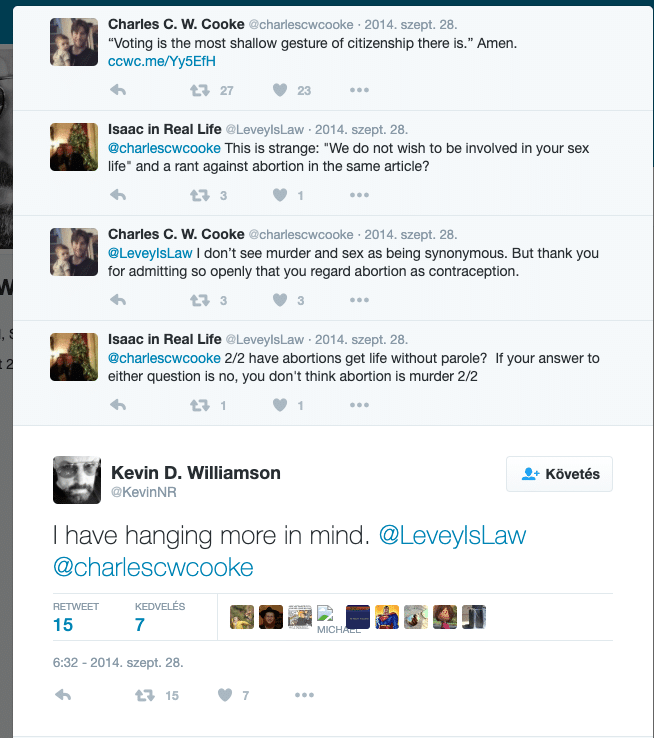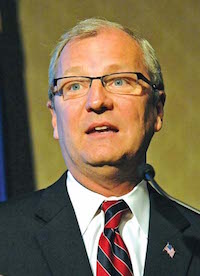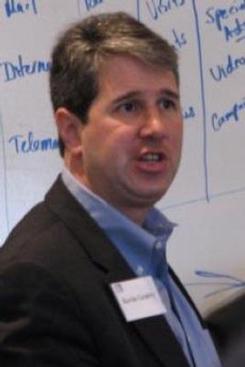Kevin D. Williamson
Credentials
- Kevin Williamson studied literature and linguistics at the University of Texas at Austin. While there, he was managing editor of the student newspaper.1“Panelist Bios” (PDF), National Review Institute Ideas Summit 2015. Archived .pdf on file at DeSmog. 2“A Refreshingly Frank Conversation w/ Kevin D. Williamson of the National Review,” Parallax Views w/ J.G. Michael, December 2,2 020. Archived .mp3 on file at DeSmog. Archived May 18, 2021. Archive URL: https://archive.ph/rRQAl
Background
Kevin D. Williamson is a conservative political commentator. Since September 2022, he has been a national correspondent for The Dispatch. 3The Dispatch Staff. “Kevin D. Williamson Joins The Dispatch, The Dispatch, September 19, 2022. Archived February 23, 2023. Archive URL: http://archive.today/vgJRI
Prior to joining The Dispatch, Kevin Williamson was a longtime “roving correspondent ” for National Review and a fellow at National Review Institute.4“Kevin D. Williamson” author page, National Review. Archived February 23, 2023. Archive URL: https://archive.ph/VNpzD
Before joining National Review in 2008, Williamson was the director of the journalism program at the Koch-funded Institute for Humane Studies at George Mason University.5“Kevin D. Williamson Books & Biography,” HarperCollinsCanada. Archived May 18, 2021. Archive URL: https://archive.ph/LAoyH
In 2021, Williamson joined the Competitive Enterprise Institute (CEI) in a “visiting capacity to head a project examining the modern environmental movement, its culture, and advocacy.” In 2022, he became a CEI writer-in-residence, “bring[ing] his perspective as a journalist and his investigative skill to exposing the growing administrative state and the effects the regulations it issues have on Americans’ lives”. ” CEI has a history of fossil fuel and tobacco industry funding, and has historically opposed regulations that would counter climate change.6“Kevin D. Williamson Joins CEI to Lead Project Examining the Modern Environmental Movement,” Competitive Enterprise Institute, May 12, 2021. Archived May 14, 2021. Archive URL:https://archive.ph/pgobv 7“Kevin D. Williamson Joins CEI as Writer in Residence,” Competitive Enterprise Institute, October 19, 2022. Archived February 23, 2023. Archive URL: https://archive.is/wip/2PJVA
Williamson has worked for many publications, including The New Criterion. He had a brief stint at The Atlantic in 2018, which ended amid public criticism of a 2014 Twitter discussion in which he said that women who have abortions should be put to death by hanging, and that doctors, nurses, or hospital staff involved should also be executed. 8Kevin D. Williamson,” The New Criterion. Archived May 17, 2021. Archive URL: https://archive.ph/yO5Rh 9Robin Abcarian. “Here’s a guy advocating death by hanging for women who have abortions,” Los Angeles Times, September 30, 2014. Archived March 24, 2018. Archive URL: https://archive.is/xjfJs 10Kevin D. Williamson. “When the Twitter Mob Came for Me,” The Wall Street Journal, April 20, 2018. Archived April 20, 2018. Archive URL: https://archive.ph/qDQPI
According to an archived author profile at the Foundation for Economic Education (FEE):
“Williamson began his journalism career at the Bombay-based Indian Express Newspaper Group and spent 15 years in the newspaper business in Texas, Pennsylvania, and Colorado. He served as editor-in-chief of three newspapers and was the founding editor of Philadelphia’s Bulletin. He is a regular commentator on Fox News, CNBC, MSNBC, and NPR. His work has appeared in the New York Post, the New York Daily News, Commentary, Academic Questions, and other publications.”11“Kevin D. Williamson,” Foundation for Economic Education. Archived May 18, 2021. Archive URL: https://archive.ph/Er0Kz
Stance on Climate Change
January 6, 2023
In a piece for The Dispatch titled “The Real Climate Change Racket,” Williamson wrote in part:12Kevin D. Williamson. “The Real Climate Change Racket,” The Dispatch, January 6, 2023. Archived January 20, 2023. Archive URL: https://archive.is/TqYBQ
“The theory of the racketeering suit filed on behalf of Puerto Rican interests is that the defendants—Exxon Mobil, Shell, Chevron, ConocoPhillips, Anadarko, Peabody, Rio Tinto, et al., not to mention ‘XYZ Corporations 1-100 and John and Jane Does 1-100’—do not have a legitimate right to be on what the plaintiffs believe to be the wrong side of the climate-change debate. As the report published at Slate puts it, the defendants stand accused of organizing an issue-advocacy campaign ‘executed through a network of dark money ploughed into think tanks, research institutions, trade groups, and PR firms, and provided a roadmap for an open-ended enterprise that is still implemented today.’”
[…]
“As one oil executive once explained to me, ‘You can say anything you want about us. We are the least sympathetic defendant on Earth.’ Climate activism of the sort that seeks multibillion-dollar verdicts from energy companies may not always be racketeering, but it is a racket—a potentially lucrative one.
[…]
“…the environmentalists haven’t lost the political fight because of some shadowy oil-company conspiracy—they have lost the fight because people are not buying what they are selling while they are literally buying what Exxon sells and not inclined to pay higher prices for it. That isn’t necessarily the right position—I myself favor a relatively risk-averse approach to the climate issue. But shaking down a dozen energy companies for billions of dollars is not going to make Puerto Rico any better off. It is going to make a handful of lawyers, consultants, and well-heeled activists a lot better off.”
December 29, 2019
Williamson wrote in National Review:13Kevin Williamson. “Do Celebrities Really Buy the Climate-Change Story?” National Review, December 29, 2019. Archived May 18, 2021. Archive URL: https://archive.ph/izRfh
“[W]hat does the global-warming gang want? There isn’t any mystery about that. You can ask them. They want political power. They want the power to reorder economic and social life along the lines they see fit, rewarding their friends and punishing their enemies, and they want to enjoy the ultimate pleasure that they can imagine — self-righteousness — while they are doing it.
“I myself have more or less conventional views of climate change and believe that adapting to it will be a challenge that imposes real costs. But I’ll believe that the celebrity activists believe in it when they start acting like it and the general-aviation section of the Pitkin County Airport looks like Rick Husband Amarillo International (!) Airport. I’ll believe they think we’re in an emergency when they start acting like we’re in an emergency.
“What they act like is people who want power. Because that is what they are.”
November 30, 2015
Williamson wrote the following in a National Review article titled “The West’s Self-Destructive Global-Warming Penance”:14Kevin D. Williamson. “The West’s Self-Destructive Global-Warming Penance,” National Review, November 30, 2015. Archived May 18, 2021. Archive URL: https://archive.ph/VbKAb
“The global-warming crusade (we mustn’t call it a ‘jihad’) is a strange exercise in Protestant virtue. Consider the endlessly repeated argument: “Even if the threat is being exaggerated; even if the models aren’t as reliable as they say; even if the scientific consensus isn’t quite so iron-clad as the activists claim, wouldn’t we be better off, still, if we consumed less, conserved more, and invested in efficiency and green alternatives?
“This is a question of virtue masquerading as a question of engineering.
[…]
“It has often been remarked that the global-warming panic is rooted in a kind of religious sentiment, but nobody ever says which religion: American Consensus Protestantism, which, having been divorced from its service to that boring old Divinity with practically Republican attitudes toward sex and marriage, seeks a new god to serve.
“Sacrifices will be required, of course: As Barack Obama promised, we are going to be obliged to adopt national policies that will raise our energy bills and thereby lower our standards of living.
[…]
“But what of the original question? Even if this turns out to be an exaggeration — even if the alarmist view of global warming turns out to be wrong on the substance and recent variation is all a matter of Milankovitch cycles or solar activity — wouldn’t we be better off adopting the reforms that the wise and holy men put forward? Wouldn’t it be better — morally better — if we consumed less, made a little less go a little farther, conserved, burned less oil and coal, exploited fewer natural resources, and exercised a little of what the old virtue-mongers used to call continence?
“Better for whom?
“Certainly not better for the poor, who, we have it on good authority, shall always be among us. (Jesus was a pretty good economist, but I believe that He may have gotten that one wrong: Poverty is, in fact, a solvable problem.) Technological and economic regression is almost always borne by those with the least power to forcibly pass along costs to other parties, and that ensures that forgone gains in the quality of material life will burden the poor rather than the well-off, whatever formal agreement is forged in or after Paris. But this exercise in virtue isn’t really about them — the poor and sweaty and miserable Them, who when they are not foundering in picturesque poverty are scheming to (sing along, Senator Sanders!) steal our jobs. No, this is about us rich people in the West, and our endless need for mortification, if not of the flesh then at least of the SUV. We’ve reduced the concept of sin to almost nothing in our shared common life, but the instinct for penance is unabated.”
December 8, 2009
Williamson provided a list of “What to Think about Global Warming,” in an article for National Review. Below are the first two points of the six he provided:15Kevin D. Williamson. “What to Think about Global Warming,” National Review, December 8, 2009. Archived May 18, 2021. Archive URL: https://archive.ph/85UD2
“The planet is getting warmer. This seems to accord with what we know. From 1906 to 2005, the average surface temperature rose by 0.74 degrees Celsius by most estimates. The planet seems to have warmed much more quickly during the second half of that interval than in the first half. There has been a recent cooling trend, it is true, but the larger trend seems to be upward. While the Climate Research Unit fraud has given us reason to be skeptical of much of the data touching the global-warming debate, this fundamental claim seems to be reasonably well documented.
- “The planet is getting warmer, and human activity is the reason. This is the real crux of the debate, and, in truth, there are several different ways of considering this claim: Human activity may be the only reason for global warming, it may be one important factor among many, it may be one minor factor among many, or it may be a trivial factor or, possibly, no factor at all.
“The Intergovernmental Panel on Climate Change does not seem to be an irresponsible organization, and I know of no obvious reason to suspect that it is involved in any shenanigans of the CRU variety. At the same time, IPCC does not do its own research; it is dependent upon the research of others, and therefore upon the scrupulousness of others. Nonetheless, they write: ‘The observed widespread warming of the atmosphere and ocean, together with ice mass loss, support the conclusion that it is extremely unlikely that global climate change of the past 50 years can be explained without external forcing and very likely that it is not due to known natural causes alone.’ (That ‘very’ is an escalation from their previous position of just ‘likely.’) Having no scientific basis to disregard this conclusion, and no strong basis to suspect IPCC’s honesty, we ought to consider this claim carefully and sympathetically.”
In his fifth point, Williamson contended that “the argument for a Kyoto-style climate regime enters into the realm of fantasy.
“Even if we could imagine an international response that was 100 percent effective in achieving its climate-mitigation goals, the price ceiling on such an effort would have to be, at most, 1–2 percent of global GDP. In all likelihood, the better response would be to take corrective and adaptive steps as we go rather than investing our hopes, and our capital, in the United Nations or a comparable organization.”
Key Quotes
January 30, 2019
Williamson wrote in The National Review:16Kevin D. Williamson. “Climate Change, Fiscal Change, and Risk,” National Review, January 30, 2019. Archived May 18, 2021. Archive URL:https://archive.ph/L46C3
“Risk-mitigation is a useful way to think about climate change and climate-change policy. There is good reason to be skeptical of the alarmist view of climate change and the maximalist approach to climate-change policy; the case for assessing the risks associated with climate change at zero — and pricing them at $0.00 — is considerably more difficult to make.”
April 24, 2015
Williamson wrote in the National Review:17Kevin D. Williamson. “Global-Warming Guacamole,” National Review, April 24, 2015. Archived May 18. 2021. Archive URL: https://archive.ph/JH7UH
“That California’s catastrophic drought is a result of global warming has become a commonplace of contemporary political rhetoric.
“That truism isn’t true: Most scientific accounts of California’s current dry spell link recent low precipitation to naturally occurring atmospheric cycles, not to global warming.
“Indeed, most of the global-warming models relied upon by those advocating more-invasive environmental policies predict that warming would leave California with wetter winters — winter precipitation being critical to the snowpack-dependent state — rather than the drier winters at the root of the state’s current water crisis.”
April 22, 2015
Kevin D. Williamson wrote in National Review:18Kevin D. Williamson. “Global Warming and Intellectual Dishonesty,” National Review, April 22, 2015. Archived May 18, 2021. Archive URL: https://archive.ph/zmsFc
“The global-warming crusaders—who are fundamentally anti-capitalism anti-globalization, and sometimes anti-human rather than genuine environmentalists—have been very successful in shaping the rhetoric of the global-warming debate as a question of science vs. the anti-scientific, the ignorant, etc. But the most important questions in the debate are not scientific questions at all.”
“It’s not as though Beijing or Delhi’s implementation of an unwanted global-warming protocol is going to proceed according to the laws of thermodynamics, or that Maxwell’s equations can tell us which economic tradeoffs undertaken to prevent global warming are likely to be effective or worth the price.
October 11, 2014
“One of the problems with the global-warming conversation is that it is a political and economic debate masquerading as a scientific debate,” Williamson wrote in the National Review, and continued:19Kevin D. Williamson. “The Cost of Carbon Reductions,” National Review, October 11, 2014. Archived May 18, 2021. Archive URL: https://archive.ph/lagCH
“The main obstacle to adopting an effective global-warming policy in the United States is not, contra Neil deGrasse Tyson et al., skepticism about scientific claims. Rather, the main obstacle to our adopting an effective global-warming policy is that the warming globe has upon it China, India, etc. Global warming is a global issue, and even radical cuts in the U.S. emissions would have little practical effect in the absence of similarly serious commitments in the rest of the world.”
Controversial Statements
Abortion
In a 2014 Twitter discussion – since deleted – Kevin Williamson said that women who have abortions should be put to death by hanging, and that doctors, nurses, or hospital staff involved should also be executed. 20Kevin D. Williamson,” The New Criterion. Archived May 17, 2021. Archive URL: https://archive.ph/yO5Rh 21Robin Abcarian. “Here’s a guy advocating death by hanging for women who have abortions,” Los Angeles Times, September 30, 2014. Archived March 24, 2018. Archive URL: https://archive.is/xjfJs 22Kevin D. Williamson. “When the Twitter Mob Came for Me,” The Wall Street Journal, April 20, 2018. Archived April 20, 2018. Archive URL: https://archive.ph/qDQPI

Williamson later defended and again promoted this view in a September 2014 edition of his National Review podcast. Some excerpts and original audio, archived at the Internet Archive, below:23Charles C.W. Cooke and Kevin D. Williamson. “Episode 71: Everyone Hates Kevin . . . Again,” National Review, September 29, 2014. Archived .mp3 on file at DeSmog.
Kevin Williamson: [00:08:58] Someone challenged me on my views of abortion. You know, saying if you really thought it was a crime, you would support things like, you know, life in prison, no parole for treating it as a homicide. And I do support that. In fact, as I wrote, what I had in mind is hanging. [00:09:14]
Kevin Williamson: [00:12:43] I’m kind of squishy on capital punishment in general, but that I’m absolutely willing to see abortion treated like a regular homicide under the criminal code. [00:12:52]
Kevin Williamson: [00:13:41] I would totally go with treating it like any other crime up to including hanging. Which kind of you know, as I said, I’m kind of squishy about capital punishment in general, but I’ve got a soft spot for hanging as a form of capital punishment. I tend to think that things like lethal injection are a little too antiseptic [00:13:59]
Kevin Williamson: [00:15:16] I think in some ways it’s worse than your typical murder. I mean, it’s absolutely premeditated. [00:15:21]
Four years later, these comments were among the reasons that The Atlantic chose to part ways with Williamson. 24Sharon Kann. “Kevin Williamson also said on his podcast that people who’ve had abortions should be hanged,” Media Matters for America, April 3, 2018. Archived May 14, 2021. Archive URL:https://archive.ph/4lYzi
On April 5, 2018, Journalist Michael Carbone tweeted portions of a memo to staff from Atlantic editor-in-chief Jeffrey Goldberg about Kevin Williamson:
“The language he used in this podcast — and in my conversations with him in recent days — made it clear that the original tweet did, in fact, represent his carefully considered views.
“The tweet was not merely an impulsive, decontextualized, heat-of-the-moment post, as Kevin had explained it. Furthermore, the language used in the podcast was callous and violent. This runs contrary to The Atlantic’s tradition of respectful, well-reasoned debate, and to the values of our workplace.”
Williamson later claimed in The Wall Street Journal that his comments on abortion had been to “mak[e] a point about the sloppy rhetoric of the abortion debate, not a public-policy recommendation.”
“Such provocations can sometimes clarify the terms of a debate,” Williamson wrote, “but in this case, I obscured the more meaningful questions about abortion and sparked the sort of hysteria I’d meant to point out and mock.” Williamson also stated that he was “generally opposed to capital punishment.”25Kevin D. Williamson. “When the Twitter Mob Came for Me,” The Wall Street Journal, April 20, 2018. Archived May 17, 2021. Archive URL: https://archive.is/qDQPI
In a March 2020 National Review column, Williamson wrote:26“The Last Pro-Life Democrat,” National Review, March 19, 2020. Archived May 18, 2021. Archive URL: https://archive.ph/8NkeR
“As a scientific matter, there is no question about what happens in an abortion: A living individual human organism is put to death at an early stage of development. No amount of metaphysical hand-waving about ‘personhood’ is going to change that.”
Key Actions
May 2021
The Competitive Enterprise Institute hired Kevin Williamson, then a columnist and correspondent at National Review, to lead a project examining “the modern environmental movement, its culture, and advocacy,” E&E News reported.27Timothy Cama. “Group hires conservative writer to examine green movement,” E&E News, May 12, 2021. Archived .pdf on file at DeSmog.
“One of the interesting — and troubling — things about the environmental movement is how completely policy disputes have been displaced by the culture-war model of politics,” Williamson said in CEI’s announcement of his new project.
“When there’s a policy debate, there is room for compromise and consensus-building. When the same issue is presented as an apocalyptic confrontation between good and evil, there isn’t any room for cooperation,” he said.
“And those of us who are interested in human flourishing with both robust economic development and a healthy environment are left with very little in the way of attractive alliances and practical policy options.”
April 6, 2021
Following the introduction of voter access laws that voting rights groups decried as “devastating” in limiting voter access, Williamson posed a question in a piece for National Review:28Kevin D. Williamson. “Why Not Fewer Voters?” National Review, April 6, 2021. Archived May 18, 2021. Archive URL: https://archive.ph/T8otM
“Much of the discussion about proposed changes to voting laws backed by many Republicans and generally opposed by Democrats begs the question and simply asserts that having more people vote is, ceteris paribus, a good thing. Why should we believe that? Why shouldn’t we believe the opposite? That the republic would be better served by having fewer — but better — voters?
[…]
“Categorically disenfranchising felons has always been, in my view, the intelligent default position, with re-enfranchisement on a case-by-case basis.
[…]
“It is a fact that many of the things that would be useful in discouraging and preventing voting fraud would also tend to make voting somewhat more difficult for at least some part of the population. Republicans generally think that tradeoff is worth it, and Democrats generally don’t,” he wrote.
Affiliations
- The Dispatch – A national correspondent since September 202229The Dispatch Staff. “Kevin D. Williamson Joins The Dispatch, The Dispatch, September 19, 2022. Archived February 23, 2023. Archive URL: http://archive.today/vgJRI
- Competitive Enterprise Institute (CEI) — As of 2022, a writer in residence “bring[ing] his perspective as a journalist and his investigative skill to exposing the growing administrative state and the effects the regulations it issues have on Americans’ lives.” In 2021 Williamson joined CEI as a “visiting investigative writer” leading a project “examining the modern environmental movement, its culture, and advocacy.”30“Kevin D. Williamson Joins CEI as Writer in Residence,” Competitive Enterprise Institute, October 19, 2022. Archived February 23, 2023. Archive URL: https://archive.is/wip/2PJVA
- National Review — Former “roving correspondent” for National Review and fellow at the National Review Institute. 31“Kevin D. Williamson,” National Review. Archived May 17, 2021. Archive URL: https://archive.ph/VNpzD Has been listed as a deputy managing editor.32Kevin D. Williamson. “What to Think about Global Warming,” National Review, December 8, 2009. Archived May 18, 2021. Archive URL: https://archive.ph/85UD2
- The New Criterion — Former theatre critic.33“Kevin D. Williamson,” The New Criterion. Archived May 17, 2021. Archive URL: https://archive.ph/yO5Rh
- Institute for Humane Studies (IHS) at George Mason University — Former director of the journalism and media program, and a seminar director.34“Kevin D. Williamson Books & Biography,” HarperCollinsCanada. Archived May 18, 2021. Archive URL: https://archive.ph/LAoyH 35“Small-Government Schmoozing: Scenes from a libertarian journalism conference,” The Nation, July 2, 2007. Archived May 17, 2021. Archive URL: https://archive.ph/9SxJK
- Foundation for Economic Education (FEE) — Former contributing author36“People,” Foundation for Economic Education. Archived May 18, 2021. Archive URL: https://archive.ph/RgFXf 37“Kevin D. Williamson,” Foundation for Economic Education. Archived May 18, 2021. Archive URL: https://archive.ph/Er0Kz
Social Media
- Formerly @KevinNR on Twitter (This account now appears to belong to someone else.)
- KevinDWilliamsonNR on Facebook (Posting seems to have ended in early 2018)
Publications
National Review
National Review lists over 5,000 pieces by Kevin D. Williamson. Notable examples of climate-related columns:
- “Central Banks and Climate Change,” National Review, April 19, 2021.
- “Biden’s Climate-Change Folly,” National Review, January 28, 2021.
- “‘Montana Glaciers 1, Climate Hysterics 0’? Check the Score,” National Review, January 9, 2020.
- “Do Celebrities Really Buy the Climate-Change Story?” National Review, December 29, 2019.
- “Climate Change, Fiscal Change, and Risk,” National Review, January 30, 2019.
- “The West’s Self-Destructive Global-Warming Penance,” National Review, November 30, 2015.
- “Global-Warming Guacamole,” National Review, April 24, 2015.
- “Global Warming and Intellectual Dishonesty,” National Review, April 22, 2015.
- “Taking Climate Alarmists Down a Peg,” National Review, July 18, 2008.
Books
- Big White Ghetto: Dead Broke, Stone-Cold Stupid, and High on Rage in the Dank Woolly Wilds of the “Real America” Regnery Publishing (2020)
- The Smallest Minority: Independent Thinking in the Age of Mob Politics. Gateway Editions (2019)
- The Case Against Trump. Encounter Books (2015)
- The End Is Near and It’s Going to Be Awesome: How Going Broke Will Leave America Richer, Happier, and More Secure. Broadside Books (2013)
- What Doomed Detroit. Encounter Books (2013)
- The Dependency Agenda. Encounter Books (2012)
- The Politically Incorrect Guide to Socialism. Regnery Publishing (2011)
Other Resources
- “Kevin D. Williamson” on Wikipedia.
- Appearances on C-SPAN
Resources
- 1“Panelist Bios” (PDF), National Review Institute Ideas Summit 2015. Archived .pdf on file at DeSmog.
- 2“A Refreshingly Frank Conversation w/ Kevin D. Williamson of the National Review,” Parallax Views w/ J.G. Michael, December 2,2 020. Archived .mp3 on file at DeSmog. Archived May 18, 2021. Archive URL: https://archive.ph/rRQAl
- 3The Dispatch Staff. “Kevin D. Williamson Joins The Dispatch, The Dispatch, September 19, 2022. Archived February 23, 2023. Archive URL: http://archive.today/vgJRI
- 4“Kevin D. Williamson” author page, National Review. Archived February 23, 2023. Archive URL: https://archive.ph/VNpzD
- 5“Kevin D. Williamson Books & Biography,” HarperCollinsCanada. Archived May 18, 2021. Archive URL: https://archive.ph/LAoyH
- 6“Kevin D. Williamson Joins CEI to Lead Project Examining the Modern Environmental Movement,” Competitive Enterprise Institute, May 12, 2021. Archived May 14, 2021. Archive URL:https://archive.ph/pgobv
- 7“Kevin D. Williamson Joins CEI as Writer in Residence,” Competitive Enterprise Institute, October 19, 2022. Archived February 23, 2023. Archive URL: https://archive.is/wip/2PJVA
- 8Kevin D. Williamson,” The New Criterion. Archived May 17, 2021. Archive URL: https://archive.ph/yO5Rh
- 9Robin Abcarian. “Here’s a guy advocating death by hanging for women who have abortions,” Los Angeles Times, September 30, 2014. Archived March 24, 2018. Archive URL: https://archive.is/xjfJs
- 10Kevin D. Williamson. “When the Twitter Mob Came for Me,” The Wall Street Journal, April 20, 2018. Archived April 20, 2018. Archive URL: https://archive.ph/qDQPI
- 11“Kevin D. Williamson,” Foundation for Economic Education. Archived May 18, 2021. Archive URL: https://archive.ph/Er0Kz
- 12Kevin D. Williamson. “The Real Climate Change Racket,” The Dispatch, January 6, 2023. Archived January 20, 2023. Archive URL: https://archive.is/TqYBQ
- 13Kevin Williamson. “Do Celebrities Really Buy the Climate-Change Story?” National Review, December 29, 2019. Archived May 18, 2021. Archive URL: https://archive.ph/izRfh
- 14Kevin D. Williamson. “The West’s Self-Destructive Global-Warming Penance,” National Review, November 30, 2015. Archived May 18, 2021. Archive URL: https://archive.ph/VbKAb
- 15Kevin D. Williamson. “What to Think about Global Warming,” National Review, December 8, 2009. Archived May 18, 2021. Archive URL: https://archive.ph/85UD2
- 16Kevin D. Williamson. “Climate Change, Fiscal Change, and Risk,” National Review, January 30, 2019. Archived May 18, 2021. Archive URL:https://archive.ph/L46C3
- 17Kevin D. Williamson. “Global-Warming Guacamole,” National Review, April 24, 2015. Archived May 18. 2021. Archive URL: https://archive.ph/JH7UH
- 18Kevin D. Williamson. “Global Warming and Intellectual Dishonesty,” National Review, April 22, 2015. Archived May 18, 2021. Archive URL: https://archive.ph/zmsFc
- 19Kevin D. Williamson. “The Cost of Carbon Reductions,” National Review, October 11, 2014. Archived May 18, 2021. Archive URL: https://archive.ph/lagCH
- 20Kevin D. Williamson,” The New Criterion. Archived May 17, 2021. Archive URL: https://archive.ph/yO5Rh
- 21Robin Abcarian. “Here’s a guy advocating death by hanging for women who have abortions,” Los Angeles Times, September 30, 2014. Archived March 24, 2018. Archive URL: https://archive.is/xjfJs
- 22Kevin D. Williamson. “When the Twitter Mob Came for Me,” The Wall Street Journal, April 20, 2018. Archived April 20, 2018. Archive URL: https://archive.ph/qDQP
- 23Charles C.W. Cooke and Kevin D. Williamson. “Episode 71: Everyone Hates Kevin . . . Again,” National Review, September 29, 2014. Archived .mp3 on file at DeSmog.
- 24Sharon Kann. “Kevin Williamson also said on his podcast that people who’ve had abortions should be hanged,” Media Matters for America, April 3, 2018. Archived May 14, 2021. Archive URL:https://archive.ph/4lYzi
- 25Kevin D. Williamson. “When the Twitter Mob Came for Me,” The Wall Street Journal, April 20, 2018. Archived May 17, 2021. Archive URL: https://archive.is/qDQPI
- 26“The Last Pro-Life Democrat,” National Review, March 19, 2020. Archived May 18, 2021. Archive URL: https://archive.ph/8NkeR
- 27Timothy Cama. “Group hires conservative writer to examine green movement,” E&E News, May 12, 2021. Archived .pdf on file at DeSmog.
- 28Kevin D. Williamson. “Why Not Fewer Voters?” National Review, April 6, 2021. Archived May 18, 2021. Archive URL: https://archive.ph/T8otM
- 29The Dispatch Staff. “Kevin D. Williamson Joins The Dispatch, The Dispatch, September 19, 2022. Archived February 23, 2023. Archive URL: http://archive.today/vgJRI
- 30“Kevin D. Williamson Joins CEI as Writer in Residence,” Competitive Enterprise Institute, October 19, 2022. Archived February 23, 2023. Archive URL: https://archive.is/wip/2PJVA
- 31“Kevin D. Williamson,” National Review. Archived May 17, 2021. Archive URL: https://archive.ph/VNpzD
- 32Kevin D. Williamson. “What to Think about Global Warming,” National Review, December 8, 2009. Archived May 18, 2021. Archive URL: https://archive.ph/85UD2
- 33“Kevin D. Williamson,” The New Criterion. Archived May 17, 2021. Archive URL: https://archive.ph/yO5Rh
- 34“Kevin D. Williamson Books & Biography,” HarperCollinsCanada. Archived May 18, 2021. Archive URL: https://archive.ph/LAoyH
- 35“Small-Government Schmoozing: Scenes from a libertarian journalism conference,” The Nation, July 2, 2007. Archived May 17, 2021. Archive URL: https://archive.ph/9SxJK
- 36“People,” Foundation for Economic Education. Archived May 18, 2021. Archive URL: https://archive.ph/RgFXf
- 37“Kevin D. Williamson,” Foundation for Economic Education. Archived May 18, 2021. Archive URL: https://archive.ph/Er0Kz






